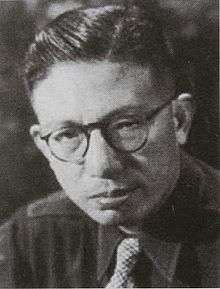Wu Yonggang
Wu Yonggang (November 1, 1907 – December 18, 1982) was a prominent Chinese film director during the 1930s. Today Wu is best known for his directorial debut, The Goddess. Wu had a long career with the Lianhua Film Company in the 1930s, in Chongqing during the war, and in the mainland after the 1949 communist revolution.[1]
Wu Yonggang | |||||||
|---|---|---|---|---|---|---|---|
 | |||||||
| Born | November 1, 1907 Shanghai, China | ||||||
| Died | December 18, 1982 (aged 75) | ||||||
| Occupation | Film director | ||||||
| Years active | 1930s-1980s | ||||||
| Awards | Golden Rooster Awards – Best Picture 1981 Evening Rain | ||||||
| Chinese name | |||||||
| Traditional Chinese | 吳永剛 | ||||||
| Simplified Chinese | 吴永刚 | ||||||
| |||||||
Biography
Wu Yonggang was born in Shanghai in 1907, but was considered a native of his ancestral home Wu County, Jiangsu in Chinese convention.[2] Wu Yonggang was one of the major leftist film directors of pre-Communist China. For the early part of his career, Wu was a set designer with Dazhonghua Baihe, before transferring to the Shaw Brothers' Tianyi Film Company.[3] He was eventually noticed by Shi Dongshan at the newly formed Lianhua Film Company.[1] His first film from the director's chair, 1934's The Goddess (under contract with Lianhua), earned both him and the film's star, Ruan Lingyu, rave reviews. A prolific director, Wu continued to make films well into the 1970s until his retirement shortly before his death including Evening Rain (co-directed with Wu Yigong) which won Best Picture at the first annual Golden Rooster Awards.
Acclaimed director Chen Kaige referred to Wu Yonggang as one of his most admired directors, and named The Goddess as his favorite film of the 1930s.[4]
Selected filmography
| Year | English Title | Chinese Title | Notes |
|---|---|---|---|
| 1934 | The Goddess | 神女 | |
| 1935 | Little Angel | 小天使 | |
| 1936 | The Desert Island | 浪淘沙 | |
| 1936 | The Pioneers | 壮志凌云 | Also known as Soaring Aspirations |
| 1938 | Rouge Tears | 胭脂泪 | Wu's remake of his own debut The Goddess for the Xinhua Film Company |
| 1946 | Loyal Family | 忠义之家 | |
| 1947 | Waiting for Spring | 迎春曲 | |
| 1947 | Decision of a Lifetime | 终生大事 | |
| 1950 | The Far Away Village | 遥远的乡村 | |
| 1952 | Hasen and Jiamila | 哈森与加米拉 | |
| 1956 | Qiu Meets the Goddess of Flowers | 秋翁遇仙记 | |
| 1958 | Lin Chong | 林冲 | |
| 1980 | Evening Rain | 巴山夜雨 | Co-directed with Wu Yigong |
Notes
- "Chinese Cinema". UCSD Chinese Cinema Web-based Learning Center. Retrieved 2008-01-02.
- Wu Yonggang 2005-07-02
- Zhang Yingjin, "Prostitution and Urban Imagination" in Cinema and Urban Culture in Shanghai, 1922–1943, ed. Yingjin Zhang (Stanford: Stanford University Press, 1999), 167.
- "The Buffalo Film Series- Wu Yonggang-The Goddess/Shen Nu" (PDF). The University at Buffalo. 2006-01-24. Retrieved 2007-05-03.
External links
- A brief biography of Wu Yonggang
- Wu Yonggang on IMDb
- Wu Yonggang at the Chinese Movie Database